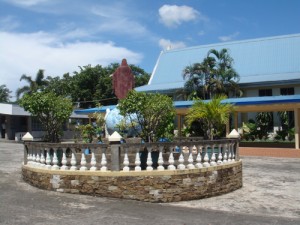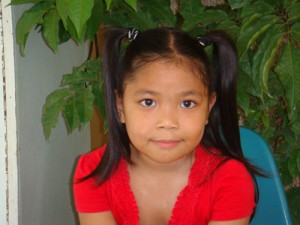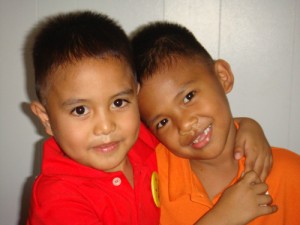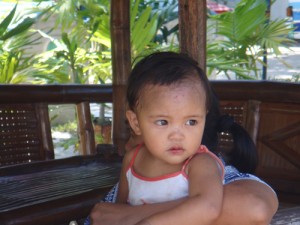This program is closed. Please contact Children of All Nations to learn about other programs that could be a good fit for your family.
Philippines Adoption[Waiting Child Photolisting] – [Philippines News & Updates]Would you like to host a waiting child in your home for a month before considering adoption? Click here to learn more! The international adoption program in the Philippines was licensed in 1989 by the Ministry of Social Welfare and Development and is overseen by the Inter-Country Adoption Board (ICAB). Party to the Hague Adoption Convention, the program adheres to all of the requirements of the U.S. law implementing the Convention. Children of All Nations is directly accredited by ICAB. The Philippines’ international adoption program is a model program for other countries around the world. If you would like more information about our Philippines program, our adoption consultants can be reached at (512)323-9595 or send us an email! CAN has been given special approval by the (*Please note, the gender of the child is not able to be requested when adopting from the Healthy Track referral program) Children are available for adoption in the Philippines for a number of reasons that include poverty, poor health and the stigma associated with being born out of wedlock. Children available for adoption from the Philippines remain in orphanages until they are placed with an adoptive family. The following options are available: Adoption laws in the Philippines allow US families to adopt relatives living in the Philippines that are within four degrees of relation. That means adoptive parents are eligible to adopt the following: a brother, sister, niece, nephew, uncle, aunt, first cousin, grandchild, great grandchild, great-great grandchild, grandniece, or grandnephew. If the relationship is beyond four degrees an adoption from the Philippines would not be possible. Adoptive parents must be able to provide proof of the relationship in their dossier. Families who would like to adopt their relative begin by filling out the Questionnaire for Relative Adoption Applicants (QRAA). The QRAA will give a brief overview of the situation of the child. Based on the facts presented ICAB will either approve or deny a family’s QRAA, if approved the case will be transferred to a local DSWD for further investigation. Relative Adoption within 4th degree of consanguinity: Relative Adoption beyond 4th degree of consanguinity: **It is important to note that for families beyond the 4th degree of relation that the child will be advocated for domestically before the case is transferred to ICAB for international placement. If there is a family in the Philippines willing and able to take the child preference will be given to that family. DSWD, ICAB, and the Philippines do not encourage pre- identification of children. It will take years to do this process and commitment is highly encouraged. In addition to the USCIS eligibility requirements for prospective adoptive parent(s), the Philippines has the following adoption eligibility requirements. If you feel you are not eligible to adopt from the Philippines, or you are unsure please contact us for a free case-by-case consultation regarding your concerns. Adoption eligibility requirements for the Philippines are subject to change per the Philippines’ adoption laws. CAN updates these guidelines as necessary. The adoption timeline varies depending on the program that the family is interested in. For families interested in pursuing adoptions from the Special Home Finding List (children with special medical needs) the wait time to be matched with a child will likely be between 6 and 12 months. After that a family will travel within 4-6 months if their dossier has been completed, if their dossier is incomplete the family should expect to travel 6-8 months after dossier completion. For relative adoption cases the timeline depends heavily on how quickly DSWD is able to prepare the file for the child. On average we see families completing their process 12 to 24 months after the submission of their QRAA. For the healthy referral program, the timeline is 24 months from dossier submission to be matched, and 4-6 months from being matched to placement. The time frame for Philippines adoption is subject to change; please consult CAN for current processing times for your adoption from the Philippines. 1. Application and Approval To access our list of children available for adoption through the Special Home Finding Program, register with our agency for FREE. To adopt a child, please complete our online agency application. If you have any concerns about eligibility requirements, please contact us before filling out this application. We will promptly review your eligibility to adopt from the Philippines once we receive your application. If approved, we will provide you with our agency contract that outlines our fees, services and important information regarding the Philippines adoption process. Upon receipt of your signed contract, CAN will start to provide you placement services for children from the Philippines. 2. Identifying a Child- Special Home Finding For the Special Home Findings program once you have completed your registration, you will be given access to the list of older children and children with special needs that are available for adoption through the Philippines Waiting Child Program. ICAB plays a strong role in all matching of Special Home Finding children, a family will apply for a child by submitting a parent profile then the board will select the family that they deem to be the best fit. From the time your family is selected for a child, you will have four months to submit your dossier to the Philippines’ Inter-country Adoption Board (ICAB). Please keep in mind that you must have selected a child to adopt before sending your dossier to the Philippines. 3. The Paper Chase Once you have applied with our agency, it is time to start assembling your dossier. Your dossier will include a home study, which will assess your readiness for international adoption from the Philippines and help prepare you for adoptive parenthood, filing with USCIS for international adoption approval, and gathering the necessary documents. All dossier documents must go through the appropriate notarization, certification and authentication processes before being sent to the Philippines. We offer a complete Dossier Preparation Service to ease your international adoption process and give you peace of mind. To ensure that prospective adoptive parents are prepared for their international adoption journey, our agency requires that parents complete 10 hours of adoption training as mandated by the Hague Convention. To satisfy these hours, we have developed an online parent training program that we are proud to include in CAN’s service plan. For an overview of the program, please click here. 4. Identifying a Child – Healthy Referral Program The Philippines adoption authority, ICAB, issues the match to families wishing to adopt through the Healthy Referral program. After families submit their complete dossier to ICAB the process of being matched begins. 5. Picking up Your Child The Philippines requires at least one parent to travel to bring home their adopted child. Families typically stay in the Philippines about one week to complete their international adoption. CAN will assist you with your travel preparations. 5. Finalizing Your Adoption Upon the homecoming of your child, you will submit a post placement report. You will follow up with these reports at the three month and six month marks as well. Once your final report is submitted, the ICAB will send the Consent to Adoption which finalizes the adoption and US citizenship of your child. It is recommended that you apply for proof of your child’s citizenship by filing the USCIS N600 form. Caretakers take special measures to emotionally prepare children for their new lives with their adoptive families. In an effort to minimize anxiety due to separation from caretakers and living environment, each child is shown photographs or video of his or her adoptive parents and familiarized with ‘mama’ and ‘daddy’ to facilitate assimilation into the coming culture. Caretakers also participate firsthand in the referral process, helping to assure that children are placed with the family that is right for them. Additionally, many children are also cared for in foster homes while awaiting adoption which exposes them to life within a family unit. The medical care available to orphaned children is very good, and excellent medical records are kept on each child is receiving care. Child Profile Reports, which include all relevant medical and developmental history, are completed and shared with adoptive families. Photographs of the children will also be shared with families at the time of referral. Stories from the Philippines Tagalog Adoption in the Classroom Issues in Adoption Travel Cookbooks Adoption Stories from the Philippines Tagalog Official State websites Health and Wellness Support and Education |
|



 Philippines adoption authority, ICAB, to place children for adoption from their Healthy Track referral program as well as placing children from the Special Home Finding List.
Philippines adoption authority, ICAB, to place children for adoption from their Healthy Track referral program as well as placing children from the Special Home Finding List.
